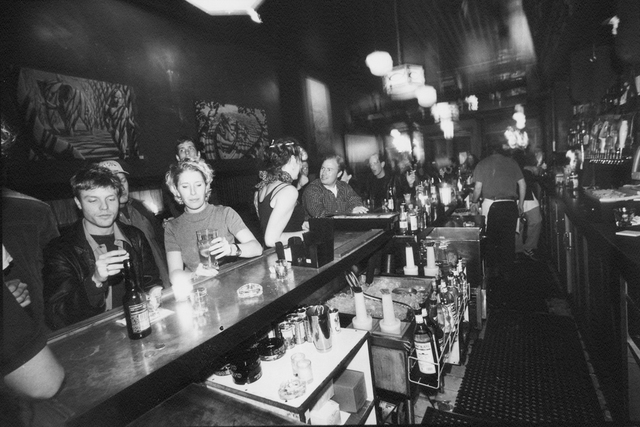In Benoit Jacquot’s world, women are the gatekeepers. A Single Girl, Jacquot’s last film to surface stateside, shows us the lovely Virginie Ledoyen as a maid on her first day of work at a big hotel. She spends most of the film peeking behind what seemed like acres of doors. The film is about that secret, childish rapture of looking where you aren’t supposed to. The little maid has a huge metaphorical power at her fingertips, as each door swings open.
Seventh Heaven
directed by Benoit Jacquot
starring Sandrine Kiberlain, Vincent
Lindon
Grand Illusion, November 20December 4
In the elegant and incredibly agile Seventh Heaven, Jacquot has reworked this simple formula: Once again, the film is about a woman opening doors. And once again, she’s lovely to look at, following the French tradition where you simply point the camera at a beautiful woman and shoot: Voilà! Filmmaking. This time, though, our Mathilde (played by the exquisitely quiet Sandrine Kiberlain, who comes into the film like the fog, on little cat’s feet) learns to fling open the doors of her own consciousness. She’s a Parisian wife and mom who works in her mother’s law firm—though lately she can’t quite bring herself to go to work. Instead she spends her time shoplifting toys, fainting, and not having orgasms.
Mysteriously, she keeps running into a somber-looking man with a chin like a cauliflower, and soon he’s lured her to lunch in an elegant restaurant, creepily empty at the noon hour. He quizzes her about her life and soon unearths the fact that she is the same age her father was when he died. From there it’s on to the orgasm problem, and he, looking stolid and middle-class, improbably proposes feng shui. He suggests she move her bed and warns her menacingly, “. . . or, you can go on sleeping facing southwest and accept the consequences.” Chinese music tinkles away in the background.
They embark on a regime of hypnotherapy. Mathilde is divinely suggestible, and she soon unearths the likelihood that her father’s death was a suicide. There’s also some possibility he sexually abused her while reading to her at night, though thankfully this prospect is not Jane Smileyed to death. The bed is moved, the memories are recovered, the hypnotist’s hand travels up her thigh during hypnosis, and we never know which of these events “cures” Mathilde. But she is better, glowing in amber light, framed in the wide gracious rooms of her apartment where once we only saw her in tight, claustrophobic shots.
If this all sounds vaguely Hitchcockian, it is. The creakiness of the recovered-memory plot feels like an intentional homage to Spellbound. Only this time the director isn’t drawing on Freud, but Lacan. Mathilde exists in a kind of dreamy, liminal state, the depths of which she must plumb before she can wake up. Jacquot treats this awakening with gentle humor, playing on the tradition of “psychological” film. Mathilde’s discoveries under hypnosis feel like a goofy kind of falling in love—she becomes a cheerful giraffe of a woman, putzing in the kitchen and grappling for a little action from her husband, Nico. Her mental health is denoted by a newfound interest in clothes.
What saves the film from being a charming, one-note essay on recovered memory is the change in Mathilde’s relationship with Nico (played by Kiberlain’s real-life husband, Vincent Lindon). Once Mathilde has moved ahead, Nico is necessarily left behind. He decides he too will see a hypnotist. He manages to find a doctor even more dour than Mathilde’s—this guy has no music, Chinese or otherwise. The doctor accuses him: “You want inside her head.” And he’s right: Nico doesn’t just want to know what Mathilde is thinking, he wants to experience her transformation, her newfound ardor and ease. The claustrophobic frustration of his inability to submit to hypnosis is palpable.
And here the film undergoes a surprise transformation, becoming a meditation on the small imbalances and kindnesses of marriage. The lovely final scene finds the two having a hard time in bed. Nico gets up in a fever of exasperation and twisted sheets. He beds down on the couch. Mathilde follows him and tucks him in. Will they make love? It’s unclear. What is clear is that she, already through the mysterious door, is willing to wait with an outstretched hand.





